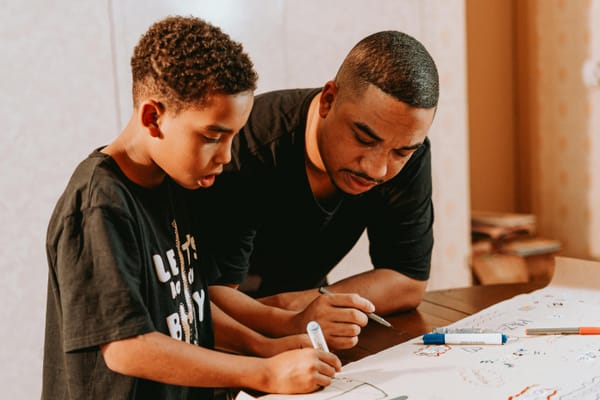Dr. Laura Markham shares 13 ways to raise teens with strong ethics and a sound value system. We are inadvertently teaching values in every moment of our parenting. Here are some useful pointers for creating a solid foundation
Some psychologists think values are impossible to teach, and it is certainly true that telling kids to be more honest, or diligent, or considerate, doesn’t work any better than telling adults to be. But if values are impossible to teach, they are too important to leave to chance.
We teach values to kids, daily, every minute of their lives. The way children learn values, simply put, is by observing what you do, and drawing conclusions about what you think is important in life. Regardless of what you consciously teach them, your children will enter adulthood with clear views on what their parents really value, and with a well developed value system of their own.
“I’ve heard that peers are more important in shaping values than parents nowadays.” Of course, parents are not the only source from which children learn values, and peers certainly influence your kids, especially as teenagers. And of course it’s healthy for young people to think for themselves and develop their own world view, as much as we may want to influence our children.
But research shows that the stronger your relationship with your child, the more her world - including the opinions of her peers - is filtered through the values she’s picked up from you. Not to mention that if she has good self-esteem and a warm home life, she is more likely to pick friends who are more in sync with your values.
And values include both what you hold dear - such as family, education, democracy, or equal dignity for all people - and what you think it is important to be - such as compassionate, hard-working, or honest.
In most families, values are never directly discussed. Most of us assume our children will develop them automatically, like magic. Teaching values consciously starts with considering what our values are and finding ways in daily life to discuss - and live - them with our children.

‘Teaching values consciously starts with considering what our values are and finding ways to live them daily with our children’
You can help your child to develop his core values. Here's how:
- MAKE IT RELEVANT TO HIS WORLD - Values seem almost theoretical until kids start talking about their own lives - which, believe it or not, are chock full of values-laden decisions. Should your 14 year old tell the teacher that some of the kids are cheating on the test? Should your 16 year old do volunteer work she doesn’t particularly care about because it will look good on her college application?Handling these decisions is what develops our values. Don’t miss the opportunity to help your child grow by supporting her in making conscious decisions.
- BE AWARE OF WHAT YOU’RE MODELLING - It isn’t what you say, it’s what you do. If you tell the kids that football is about fun and skills and exercise and teamwork, but your first question is about who won the game, they’ll learn that winning is more important than anything else. If you talk about honesty but lie about their age to get a cheaper ticket, it not only puts your child in an uncomfortable position, they learn that cheating is okay under certain circumstances.
- HELP YOUR CHILD DEVELOP EMPATHY - Empathy is the foundation of compassion, which is the foundation of values. We don’t learn empathy by being told to feel it. The only way teens (and children of all ages) can learn empathy is by being treated empathically, and by watching you respond to others with compassion and kindness.
- USE DISCUSSION STARTERS - Choose books to read and movies to watch with your child, with the express goal of building character. Of course, a careful choice is not enough, you also need to have a discussion about what you just read or watched. Does she think the character made the right decision? Why or why not? At the dinner table, come armed with a good question or two to start the ball rolling. Or share an ethical dilemma you came across today in your own life. They’re all around, if you pay attention, from cutting someone off in traffic to sharing gossip.
- CONSCIOUSLY TEACH AND MODEL GOOD SPORTSMANSHIP - Some people seem to be more competitive than others from birth, but all of us need to be taught how to be good sports. Your help will make it easier for your child to find genuine solace in a game well played, and to mean it when he says “Good game!” to every former opponent, whether he’s lost or won.
- TALK EXPLICITLY ABOUT YOUR VALUES AND WHY THEY ARE IMPORTANT TO YOU - What IS integrity? What is our obligation to our neighbour? Why is respectful behaviour important in a church, synagogue or mosque? Helping children interpret the world is a crucial responsibility of parents.
- TALK ABOUT WHY YOU MAKE CERTAIN DECISIONS BASED ON YOUR VALUES - Why are you voting for that candidate? In fact, why are you voting? And before you enter the voting booth, let her help you vote.
- LABEL AND REINFORCE EXPRESSION OF VALUES - When you see your child demonstrating a value that’s important to you, recognize your child for it, as specifically as possible. “I noticed how kind you were to Ben when he split up with his girlfriend.” “I really appreciated that you were honest with me about what happened at school.”
- MODEL COMMUNITY INVOLVEMENT - Whether it’s working for the PTA or volunteering locally, your kids need to see that you’re committed to the welfare of the larger community. Help them appreciate how the invisible work of others helps each of us daily, and that the more blessings we have in our lives, the more responsibility we have to extend help to others.
- VOLUNTEER FOR COMMUNITY SERVICE PROJECTS AS A FAMILY - Try toy collections or visiting the local nursing home. My children needed my leadership and coaxing to be willing to volunteer at a local soup kitchen with me, but they ended up loving it and wanting to do it again.
- ALL TEENS SHOULD GET AN OPPORTUNITY TO CONTRIBUTE THEIR OWN MONEY TO CHARITY. - Many families use a tripartite allowance. The lion’s share is their own spending money. Split the rest in half and put it in two separate containers, one marked “Charity,” the other marked “Savings.” Savings is to help buy that bike, or to buy a present for her friend. Charity is to be given away to a worthy cause the child chooses. A good time to do this is their birthday. Some kids will be moved by a news report of people in need and will pack off their coins to contribute. You might offer to match their contribution.
- CONFRONT CULTURAL MESSAGES ABOUT MONEY - Responsible use of money is a value that is challenging to teach in this acquisitive culture. You’ll probably need to start by getting clear about your own values around money. Is being a millionaire an appropriate goal in life? When he loses his mobile should he pay for a new one? Is it okay for your child to spend all her birthday money on herself? Even if your family can afford to pay for university, should he work a part-time job to contribute?
- RESIST LECTURING - My kids tease me that I think every moment is a “teachable moment.” Of course, teachable moments only work when children are ready to learn, and most humans experience lectures as alienating. Instead, try asking questions to find out more about the decisions he’s making and the thinking behind those decisions - and share your own views sparingly. He’ll probably learn more from the process of articulating his dilemmas and noticing the moral implications of his choices than he would have from a lecture - and he’ll feel more connected to you, too, because you’re listening.
Dr. Laura Markham is the author of three best-selling books, mum and founder of ahaparenting.com
MORE INSPIRATION
ADVICE Get plenty of inspiring, heartfelt advice at ahaparenting.com/ages-stages/teenagers
READ Parenting Teens with Love and Logic: Preparing Adolescents for Responsible Adulthood by Jim Fay and Foster Cline







